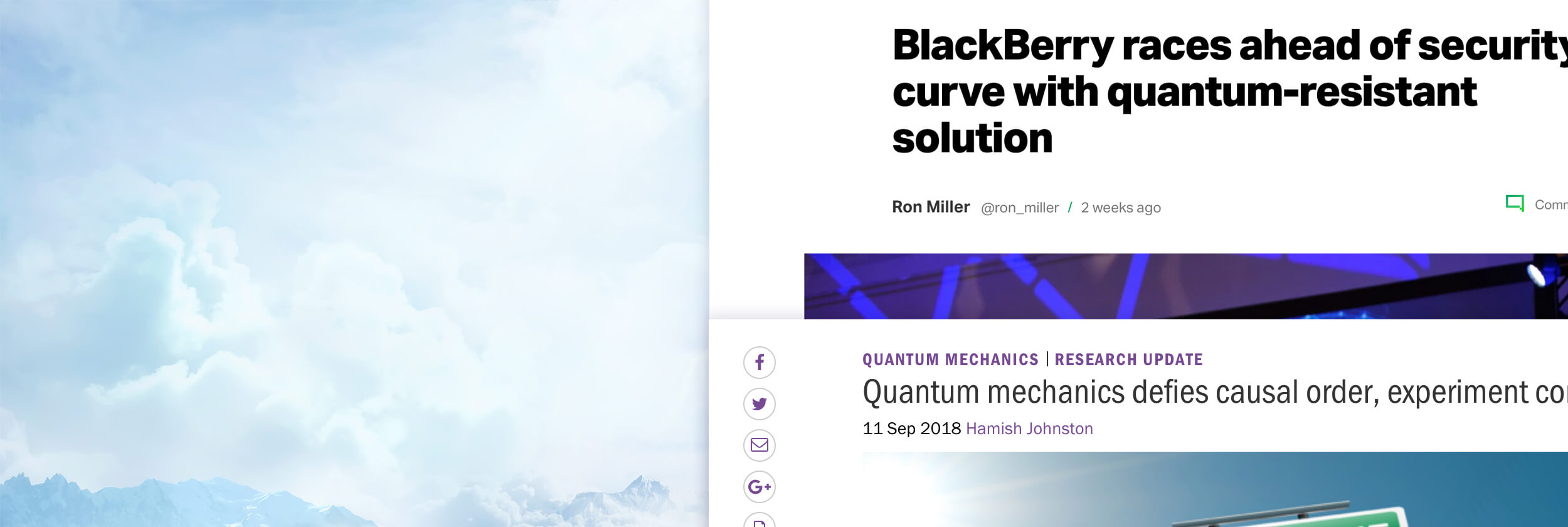
Cloud Computing News #11: Quantum Computing is the New Space Race
Post • 3 min read
This week we focus on quantum computing.
Classical computers store information in bits that are either 1 or 0, but quantum computers use qubits, which can be thought to exist in both states of 1 and 0 at the same time, and also influence one another instantaneously via a process known as “entanglement". These exotic new qualities for quantum bits mean that upcoming quantum computers computing power will be exponentially larger and faster. Quantum computing is expected to, for example, boost machine learning and have a big impact on artificial intelligence - and cloud services are being looked on as the method for providing access to quantum processing.Now as Nordcloud´s partners Google and Microsoft are investing massively into quantum computing, we are keenly following this development to be ready to bring this power to our customers in the future.
BlackBerry races ahead of security curve with quantum-resistant solution
According to TechCrunch, Black Berry announced a new quantum-resistant code signing service that anticipates a problem that does not yet exist. “By adding the quantum-resistant code signing server to our cybersecurity tools, we will be able to address a major security concern for industries that rely on assets that will be in use for a long time. If your product, whether it’s a car or critical piece of infrastructure, needs to be functional 10-15 years from now, you need to be concerned about quantum computing attacks,” Charles Eagan, BlackBerry’s chief technology officer, said in a statement. While experts argue how long it could take to build a fully functioning quantum computer, most agree that it will take between 50 and 100 qubit computers to begin realizing that vision. Read more in TechCrunchQuantum mechanics defies causal order
Physics World highlights an experiment by Jacqui Romero, Fabio Costa and colleagues at the University of Queensland in Australia, that has confirmed that quantum mechanics allows events to occur with no definite causal order. In classical physics – and everyday life – there is a strict causal relationship between consecutive events. If a second event (B) happens after a first event (A), for example, then B cannot affect the outcome of A. This relationship, however, breaks down in quantum mechanics. In their experiment, Romero, Costa and colleagues created a “quantum switch”, in which photons can take two paths. As well as making an experimental connection between relativity and quantum mechanics, the researchers point out that their quantum switch could find use in quantum technologies. “This is just a first proof of principle, but on a larger scale indefinite causal order can have real practical applications, like making computers more efficient or improving communication,” says Costa. Read more in Physics WorldTwo Quantum Computing Bills Are Coming to Congress
According to Gizmodo, quantum computing has made it to the United States Congress. China has funded a National Laboratory for Quantum Information Sciences, set to open in 2020, and has launched a satellite meant to test long-distance quantum secure information. “Quantum computing is the next technological frontier that will change the world, and we cannot afford to fall behind,” said Senator Kamala Harris (D-California). “We must act now to address the challenges we face in the development of this technology—our future depends on it.” The bill introduced by Harris in the Senate focuses on defense, calling for the creation of a consortium of researchers selected by the Chief of Naval Research and the Director of the Army Research Laboratory. Another, yet-to-be-introduced bill, seen in draft form by Gizmodo, calls for a 10-year National Quantum Initiative Program to set goals and priorities for quantum computing in the US; invest in the technology; and partner with academia and industry. Read more in GizmodoGet in Touch.
Let’s discuss how we can help with your cloud journey. Our experts are standing by to talk about your migration, modernisation, development and skills challenges.

Ilja’s passion and tech knowledge help customers transform how they manage infrastructure and develop apps in cloud.
Ilja Summala
LinkedIn
Group CTO
